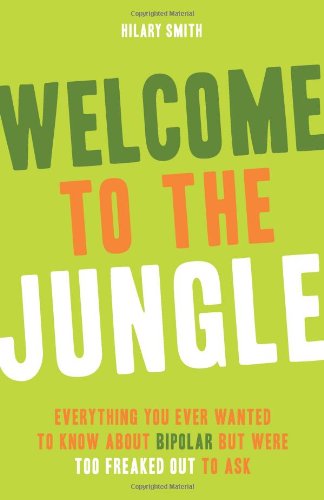 Hilary Smith's book Welcome to the Jungle starts with the buy in, "Everything you ever wanted to know about bipolar but were too freaked out to ask!" and ends with a metaphor about finding your "own unique strategy, philosophy, and game wisdom" for making it through the ever rule/round changing video game of life. Final closing statement: "Live large. Think big. Go for walks." A statement that the previous reader of the copy I just finished reading noted in the margins as "Sound advice."
Hilary Smith's book Welcome to the Jungle starts with the buy in, "Everything you ever wanted to know about bipolar but were too freaked out to ask!" and ends with a metaphor about finding your "own unique strategy, philosophy, and game wisdom" for making it through the ever rule/round changing video game of life. Final closing statement: "Live large. Think big. Go for walks." A statement that the previous reader of the copy I just finished reading noted in the margins as "Sound advice."
I'd agree.
Smith's book is part rant, part reference and part how to but it is all supportive, non-judgmental and non-pathologizing. WIN. Plus, it takes you through a pretty expansive journey: from starting to notice (or having others notice) that you might be in need of a little extra support, to navigating diagnoses, disclosure to partners, figuring out what treatments are the best for you and, once finding the rhythm of life that best supports you, how to interact with aid/organizations/institutions/doctors/insurance in a way that can keep you in that positive rhythm cycle. DOUBLE PLUS, there's a chapter entitled: "Hippie shit that actually works: Herbs, wilderness time, and other ways to help you keep your shit together."
You had me at "Hippie shit."
The one caveat to my overwhelming thumbs up is that it did seem a little biased to the side that medication will likely always be part of the life story of someone living with bipolar. I think in many cases this is true and also the overwhelming belief of most folks living or working with the challenge of bipolar. Even here, Smith is very clear that every journey is different. I would just echo this... loudly. Smith also offers some ways to explore how to set up safety when figuring out if medication needs to be part of your journey. This exploration (not whether or not one takes medication) is really what's important to me. I think consciousness and honoring around our internal meter for what is right for our bodies, hearts and spirits is an invaluable part of any healing adventure. I'm also open to the explanation of the light nature of these asides being more about Smith's casual, accessible and very humorous tone than any pro-med rhetoric.
All in all I would highly recommend this book for anyone living with bipolar, loving someone with bipolar, working with folks who are working with their bipolar or really anyone that wants to feel less crazy in this sometimes crazy world. With the holidays looming ahead I can't help but appreciate the way that Smith sets up bipolar like the awkward, inevitable, bio-family get together. Meeting your bipolar head on (with self-care measures in place to help you stay calm in the chaos and a surefire exit strategy for when shit really hits the fan) allows you to see it for what it is, gain insight about who you are, where you came from, what you like and what serves as a reflection for things you want to look different in your unique journey.
Happy reading! You can also listen to a podcast interview with Smith here (we haven't yet but are putting it on our roadtrip listening list) or visit Smith's website here.
----------
Traci is a fan of useful reflections as healing tools whether they be therapy, film therapy, bibliotherapy, art therapy, the list goes on. She also appreciates a well placed expletive, especially when utilized in the accurate way that Smith uses them to describe the beautiful and ridiculous chaos of life.

